One consistency with developers these days is their distaste or even disgust with 2D sprite based animation. In today's industry supported by mega hits like GTA and COD, it seems that in order for a game to achieve any modicum of success, it needs to attempt at pandering to the lowest common denominator, and the most idiot-proof method of achieving that without sacrificing the producer's overall vision is probably to utilize hyper realistic presentation.
Hang on. What's wrong with two dimensional sprite based pixels in the first place? Why is it usually relegated to second tier fighters and platformers? Granted, a Kratos sprite ripping out the gonads of a Cyclops would probably not be as visceral and channel the slapstick spiritness of an Acme cartoon. Likewise, Nathan Drake scaling lush hand drawn backgrounds would probably break the immersiveness and whatever shock & awe Naughty Dog wanted to convey. Games like God of War and Uncharted work so well because they utilise cutting edge graphics. Nathan Drake's adventures are far superior to Lara Croft's original shennanigans, largely thanks to advances in technology.
JRPGs in particular, also seem to fall squarely into the shock-&-awe category when it comes to graphical presentation. Ironically, I cannot think of a single example that has truly benefitted from the utilisation of polygons.
Why do gamers choose to play JRPGs in the first place? Easily, the top 3 reasons most often quoted are Story & Setting, Characters and Gameplay. This is my contribution why a 2D presentation and gameply can better convey these aspects over your new-fangled 3D.
Gameplay
I want to touch on gameplay first because this is often the most contentious and divisive. I had previously an article about this, and it is no secret that I abhor gameplay which requires constant player input during battles and much prefer a simple menu-driven system where I control the ebb and flow of battle. This is where all divisive opinions come charging in. I know for a fact, that a majority (basically the Western market) of gamers favor dynamic and real time player involvement in JRPGs.
What may be lost on many gamers is that the Japanese are a very traditional people. They value rote and conformity over individuality. Their games are about tweaking and enhancing existing mechanics (think Street Fighter) rather than complete reinventions. FFXII is generally well received in the West because it overhauled its mechanics to play like a single player MMORPG. Anyone ever stopped to ponder how well did it fare in Japan? For all the acclaim that Fallout 3 and Skyrim receives, both only have a small core following in Japan. The newest Dragon Warrior would obliterate anything the West throws at Japan, and here is a series that has by and large, remained the same over 2 decades. FFIX, often derided by Western gamers as the least innovative and "boring" Playstation JRPG, happens to be Hironobu Sakaguchi's favorite iteration. Talk about flipping the bird to Final Fantasy's creator.
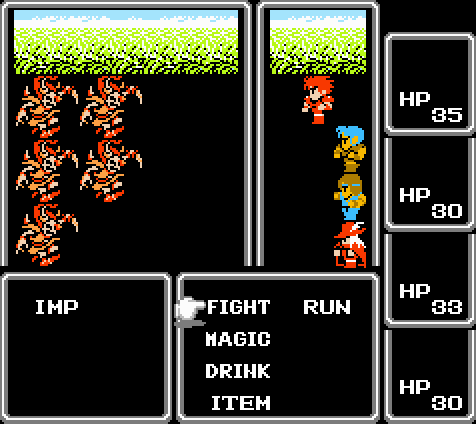
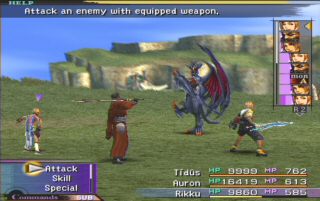
Adhere to tradition. Pretty the game up, but keep the goddamn overworld. Its not rocket science.
JRPG gameplay have traditionally always been about some variation of the menu driven system, where the player controls the entire party, makes the selections and watch the carnage unfold onscreen. Unfortunately, thanks to the collective noise generated by the fans (which the West forms the majority) to shake up the gameplay and eliminate traditional JRPG tenets like grinding, random encounters and the menu system. Granted, this has little bearing on presentation style, but I opine that if gamers had just left developers alone to do their thing based on what worked previously, they would not have to forcibly convert what is essentially 2D gameplay into some bastardized 3D anomaly that ends up alienating the very fans you created the games for.
Characters
In any JRPG, its characters carry the story and everything that happens in the interim. They are what separate a ho-hum experience from a classic. Sprites allow a character to showcase an entire range of emotions that can never be fully replicated with today's technology. Even in the 16-bit days, the limited range of movement for the characters were able to convey a whole range of emotions without any voice acting. You knew when they were angry, sad, happy and even sarcastic. Incredibly, many times the exact same sprite tile was used to convey vastly different emotions, and yet players grasped the context immediately.
Look at a modern last year's Rayman Origins. The game was beautiful and hosted an incredible cast of likeable characters, far more advance and far prettier than anything produced in the 90s. Rayman (and everyone else) were able to convey all sorts of mannerisms and actions with unique animations. It didn't matter what expression was required, the chracter would be able to present it without ambiguity. Wind Waker's Link had way far more character than his counterpart in Twilight Princess or Skyward Sword even without saying a word.


Wind Waker Link's reactions when Twilight Princess Link watches fairy porn
Now take FFXIII-2's Lightning. The chracter model cost millions of dollars to animate, and the end result shows an impeccably rendered Lightning with half opened mouth. Is she scared? Shocked? Anticipating? Without any speech, there is no way to discern the context of her actions.
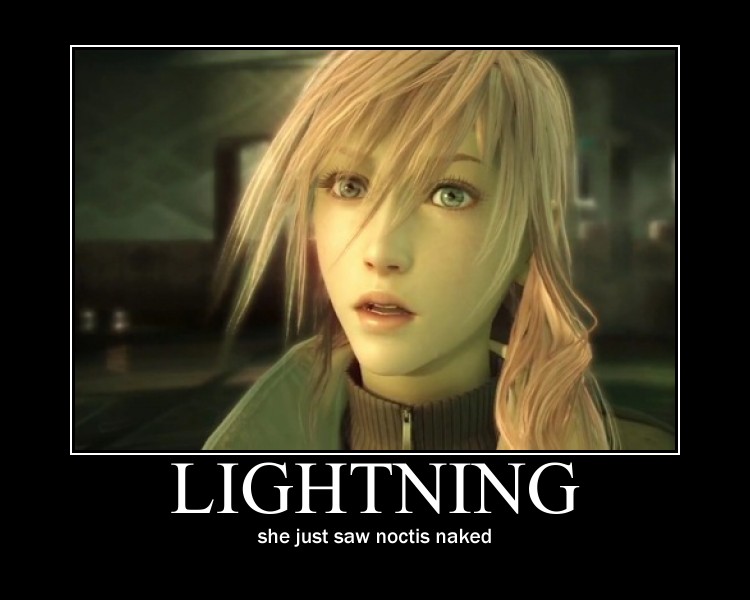
Must have missed that portion of the game
The World & Setting
This is more to do with economics anything else, but a lush 3D overworld comes with a price: exploration elements. Again taking perennial whipping boy FFXIII, the world of Gran Pulse looked breathtaking. After opening up all accessible areas on Pulse, it took a good half hour to fully traverse every single available path, yet there was nothing to do beyond hunting Marks and playing stupid minigames. There were no secret dungeons, no secret treasure, no hidden towns, no random macguffins to indicate there was anything worth doing. The brutal irony? Everyone who's anyone wished they could simply teleport from each Mark to the next without having to run through half of the overworld each time. Star Ocean: The Last Hope had a proper overworld, again with hardly anything to explore. Simply put, either the developers are too lazy to create genuine exploration elements, or its too expensive to render entire towns or dungeons.
2D sprites side step all of these problems by easily allowing optional towns or dungeons to be added with a simple sprite tile. Need a new optional dungeon for the sake of exploration? Just add a cave entrance into the mountains and that's another hour or two of gameplay right there. Need a random castle in the middle of nowhere to host devious monsters guarding great treasure? Drop a tile set right there.
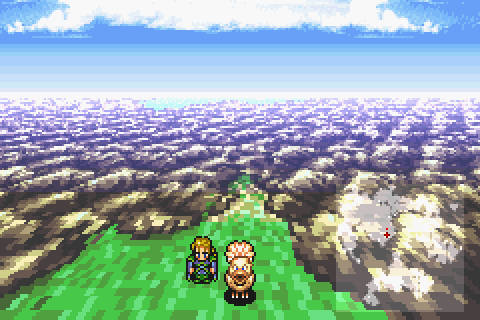
Another 40 minutes of gaming bliss just like that
And of course, a 2D overworld allows for the easy creation of *multiple* overworlds to greatly expand the scope of the game. Light/Dark World, Earth/Moon World, Present/Past/Future World all easily done if sprite technology is utilized. Unless you want the next big JRPG to cost $200 a pop, this will not happen in so-called modern 3D photorealistic RPGs.

Admit it. You never imagined another entire world that late into the game
Imagination & Creativity
Anyone remember the FFVII movie Advent Children? Remember the first time you saw the cast and Midgar rendered in full CGI glory? It definitely stood closely to the mythos of FFVII without some smart-ass producer deciding it needed a "reimagination" for a new audience. It all went well for the first 20 minutes, then Cloud met Kadaj and Dragonball Z hit full gear. Yes, its not that difficult to imagine boxy-no-hands Cloud and gang as having superpowers what with slaying Weapons the size of small buildings with nothing but shurikens and fists, but to see photorealistic versions of Yuffie running vertically up a building is just jarring and ridiculous.
Sin from FFX and Lavos from Chrono Trigger bear many striking similarities. Both are portrayed as alien entities hiding in massive shells that cannot be destroyed by any army in their respective worlds. When battling Sin, you took Wakka and threw blitzballs at its massive shell to deal damage. Its as stupid as it sounds. Yet when Ayla used her bare fists to whale on Lavos, it didn't seem to matter.
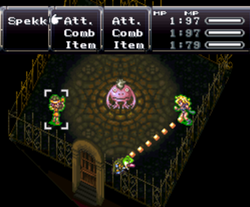
Healed by amphibian saliva. Sounds legit.
Sprites allow designers and developers to go crazy with their ideas, where practically anything is possible. The sprite can be modeled to do anything, and developers can suspend reality while dreaming up their projects. When you go all gritty realistic, your ideas suddenly have to be grounded in reality that's how humans are wired to react. If a machine hovers mid-air in game it makes perfect sense, but if a human does the same the bullshit sensors in our head goes off, even though its a fantasy game. Even in the original Kingdom Hearts when Sora flies in the Neverland world, a swirl of stars are visible around Sora to imply that magic is involved. Humans don't just fly!

Humans also don't leap 3000 feet into the air and cleave a demi-god dragon either. Without Materia.
Conclusion
I personally have a very strong belief that the current malaise of the JRPG genre owes a lot to the fact that many developers and publishers have not latched on to what made the JRPGs of the past so classic, and how utilizing modern 2D technology could change the landscape. The secret lies in their mode of presentation to create fantastic worlds and stories without the shackles of realism and artificial consumer expectation. No doubt a beautiful fully 2D blockbuster JRPG would probably alienate a good portion of gamers weaned on ultra COD realism and while that may affect sales, developers also need to realize that producing such games would lower the production costs significantly, and encourage more innovation. If one so desires fancy real time swordplay, why not just pick up Devil May Cry instead of whining that the latest JRPG plays just like it did 10 years ago? I sure don't see anyone clamoring for Call of Duty to become an action platformer even though each annual release is 95% carbon copy to its predecessor with different backgrounds.
VentureBeat's mission is to be a digital town square for technical decision-makers to gain knowledge about transformative enterprise technology and transact. Learn More
